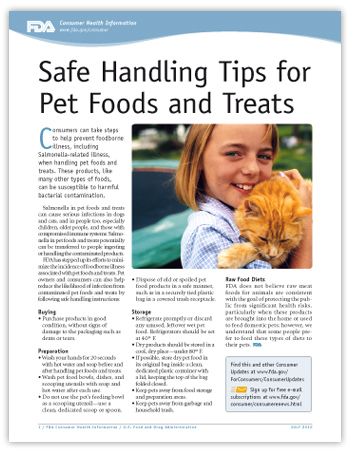For Consumers
Safe Handling Tips for Pet Foods and Treats
Printer-friendly PDF (532 KB) |
 Get Consumer Updates by E-mail
Get Consumer Updates by E-mail
Consumers can take steps to help prevent foodborne illness, including Salmonella-related illness, when handling pet foods and treats. These products, like many other types of foods, can be susceptible to harmful bacterial contamination.
Salmonella in pet foods and treats can cause serious infections in dogs and cats, and in people too, especially children, older people, and those with compromised immune systems. Salmonella in pet foods and treats potentially can be transferred to people ingesting or handling the contaminated products.
FDA has stepped up its efforts to minimize the incidence of foodborne illness associated with pet foods and treats. Pet owners and consumers can also help reduce the likelihood of infection from contaminated pet foods and treats by following safe handling instructions:
Buying
- Purchase products in good condition, without signs of damage to the packaging such as dents or tears.
Preparation
- Wash your hands for 20 seconds with hot water and soap before and after handling pet foods and treats.
- Wash pet food bowls, dishes, and scooping utensils with soap and hot water after each use.
- Do not use the pet's feeding bowl as a scooping utensil—use a clean, dedicated scoop or spoon.
- Dispose of old or spoiled pet food products in a safe manner, such as in a securely tied plastic bag in a covered trash receptacle.
Storage
- Refrigerate promptly or discard any unused, leftover wet pet food. Refrigerators should be set at 40º F.
- Dry products should be stored in a cool, dry place—under 80º F.
- If possible, store dry pet food in its original bag inside a clean, dedicated plastic container with a lid, keeping the top of the bag folded closed.
- Keep pets away from food storage and preparation areas.
- Keep pets away from garbage and household trash.
Raw Food Diets
FDA does not believe raw meat foods for animals are consistent with the goal of protecting the public from significant health risks, particularly when these products are brought into the home or used to feed domestic pets; however, we understand that some people prefer to feed these types of diets to their pets.
This article appears on FDA's Consumer Health Information Web page, which features the latest on all FDA-regulated products.
Updated: March 30, 2010








